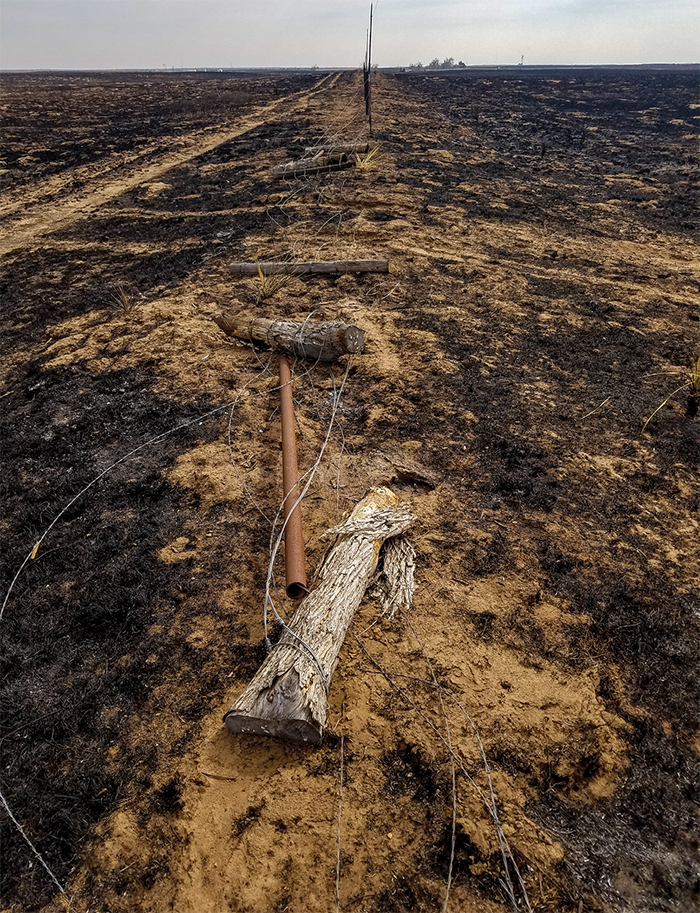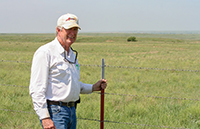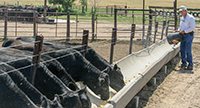
About a year after the fire swept through, on a rapidly warming morning in early June 2018, Dennis McKinney ’82/84 steers his red flatbed truck slowly through rugged tire tracks toward the middle of a lush green field of irrigated alfalfa in southwest Kansas. His purpose is to make sure the engine stationed there to operate the water supply system is properly oiled. A panorama of rain-thirsty prairie grasses and fitfully maturing wheat fields stretches in all directions as far as the eye can see.
A little more than a year ago, on March 6, 2017, this alfalfa field near the line dividing Kiowa and Comanche counties west of U.S. Highway 183 was an oasis for some 150 cattle – most belonging to McKinney’s farming neighbor and a few of his own. “They were happy as could be,” McKinney says with a wry smile that hints at a more desperate situation. A fourth-generation farmer and rancher, he has for years tended to land that on that warm, windy day marked the eastern fringe of the largest wildfire in Kansas history. The Starbuck Fire, named after the fire chief of tiny Slapout, Okla., burned more than 660,000 acres in Oklahoma and Kansas. The majority of it raged in Meade, Clark and Comanche counties, destroying grassland, property and livestock while forcing evacuations in a few small communities.
 McKinney, like many others, assisted people in direct contact with the fire, including his daughter Kelly’s in-laws near Englewood, Kan., before the spreading flames forced him to retreat toward his farm. Using a tractor and disc to build fireguards to protect some of his land assets, McKinney couldn’t totally avoid the trail of blackened earth. Almost 500 acres of his grazing pasture burned and 3½ miles of fencing was destroyed. “A neighbor of mine and I had disked around this area and disked around our hay pile,” recalls McKinney, who lost none of his cattle in the wildfire. “The fire was blowing from the southwest, and then it changed and was blowing right into us. The fireguard held and it saved our hay, but you couldn’t see the end of the tractor because the smoke was so dense.”
McKinney, like many others, assisted people in direct contact with the fire, including his daughter Kelly’s in-laws near Englewood, Kan., before the spreading flames forced him to retreat toward his farm. Using a tractor and disc to build fireguards to protect some of his land assets, McKinney couldn’t totally avoid the trail of blackened earth. Almost 500 acres of his grazing pasture burned and 3½ miles of fencing was destroyed. “A neighbor of mine and I had disked around this area and disked around our hay pile,” recalls McKinney, who lost none of his cattle in the wildfire. “The fire was blowing from the southwest, and then it changed and was blowing right into us. The fireguard held and it saved our hay, but you couldn’t see the end of the tractor because the smoke was so dense.”
The Starbuck Fire wasn’t McKinney’s first brush with nature’s fury. Almost 10 years ago, he and his then-teenage daughter, Lindy, huddled in a basement bathtub at their residence in nearby Greensburg while an EF5 tornado roared through the town on an early May evening. The tornado destroyed the McKinney’s ranch-style home, carried his truck almost a mile into town, and carved a path of destruction that killed 11 people.
Most people are spared from one natural disaster in their lifetime, let alone two. It’s a realization that has crossed McKinney’s mind, but never in a negative way for long. “If you study what the early settlers went through, their challenges were just as great and you wonder what in the world moved them out here,” he says. “When you think of the advantages we have over what our predecessors had or what most people in the world have, we’re fortunate.” The former state treasurer who served 10 terms in the Kansas House of Representatives adds, “I tell people if you have to go through a natural disaster like a tornado, you certainly want to be an American, and
I recommend you be a Kansan.”
ALMOST EVERY DAY, McKinney leaves the home he and his wife, Jean, rebuilt after the tornado to visit his mother, Mary, who also lives in Greensburg. He then heads south to the farm where Mary and his father, Harold, who died last December, raised Dennis and his three siblings. Even after earning a bachelor’s degree in political science and a master’s degree in urban affairs from WSU, the pull of farming and raising cattle remained strong. “You enjoy being outside facing a different set of challenges every day,” he explains

cattle in the 2017 Starbuck Fire,
the loss of cattle, pigs, and other
livestock was devastating to
somefarmers and ranchers who
foundthemselves in the wildfire's
path. Thousands of hogs and an
estimated 9,000 head of cattle
were lost.
McKinney honks the horn of his truck at a small herd of cattle he and longtime farmhand, T.J. Harvey, are guiding across a drought-stricken wheat field turned over to grazing. “Some days you wonder, ‘What the hell am I doing here?’” he says. “Right now, I’m trying to figure out how to handle the personality of this group of cattle. Later on, I’ll try to figure out how I’m going to improve my cash flow.”
In between honking the horn, an occasional “C’mon, girls!” and a few frowns of disgust aimed at bovine stubbornness, he reveals the roots of his calling to politics. During his last six terms representing Kansas’ 116th District, he was Democratic Party minority leader in the House before then-Gov. Kathleen Sebelius appointed him to the treasury post. “I grew up in a family where politics were discussed around the table,” he says. “I grew up in the civil rights era and with the Vietnam War and all the conflict and tumult of that era, so we were tuned into politics and public affairs. My dad told stories about the Depression and the Dust Bowl and how the federal government started the Soil Conservation Service. That’s probably one of our better cases of success of a public-private partnership.”
McKinney’s affinity for constituent services strengthened over time as he saw results assisting people with government-related issues. “That’s what I enjoyed the most about being in the legislature,” he says. “In this district, you just kept meeting good people and working with smart people, and helping them solve problems was most rewarding.”
Dropping feed periodically to entice the herd, McKinney sees parallels in the psychology of raising cattle and governing properly. He strategically places his truck upwind of the cattle, allowing the scent of feed to drift. “They become much easier to handle,” he says. “Cattle work is kind of like working the public sector to the extent that if you can lead versus push, you get better outcomes and much less stress.”
McKINNEY HAS BECOME a firm believer in divine intervention in the aftermaths of the Greensburg tornado and Starbuck Fire. Next door to his Greensburg home, a concrete slab remains partially covered by trees and other vegetation. In 2007, it was where McKinney’s neighbor, Kelsey Schroth, and her baby boy, Jayden, took cover in their home while the tornado transformed it to rubble. “I thought they were gone,” McKinney says. But neither the McKinneys nor their neighbors were hurt.
Similar good fortune shielded him the day of the wildfire. He was trailing a group of Comanche County firefighters, including his farmhand Harvey, when low fuel may have saved him. “I was right behind them because we had gone over to help my daughter’s father-in-law move cattle out of the way,” McKinney explains. “I pulled off for gasoline and they went on through. I headed east out of Ashland and hit the head fire. It hit the highway just ahead of me. I’m glad I wasn’t 30 seconds earlier. It wasn’t a steady line of fires. They were jumping, spinning up these yellow vortexes like a whirlwind.”
For Harvey, the scenes he witnessed elicited a gamut of emotions, with the loss of livestock being one of the toughest – and the safety of people feared missing the best. “I was at a place where the flames were so high, and they hollered on the radio and said not everybody got out,” he says. “There was no way we could get to them. Your heart just sunk. Right before we went back in, they said the lost had been found. Oh,
I tell you that was an amazing feeling!”
At McKinney’s farm, damaged fence that cost between $8,000 and $9,000 per mile to replace was repaired within 60 days. Remnants of the charred wooden fence posts are piled in a field where cattle graze. A light snow fell soon after the wildfire, triggering Mother Nature’s renewal, but McKinney says ensuing drought tempered progress. “The main thing is rain,” he says about the greatest need for his land, where he grows wheat, milo and forage sorghum for winter feed. “And then managing our grazing so we graze it a little bit, but not too much.”
McKinney pauses, then repeats the farmer’s mantra. “But the main ingredient is rain.”





